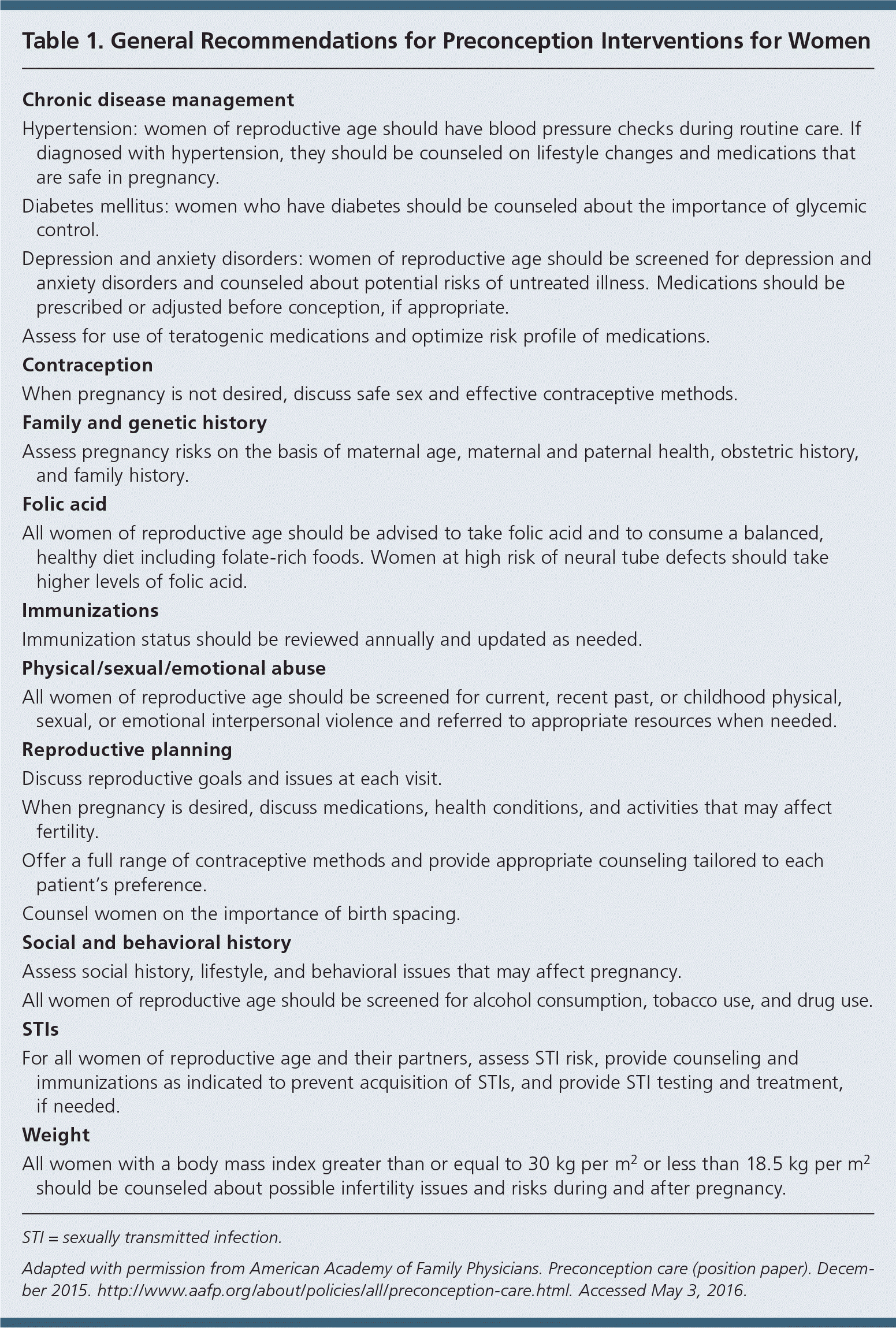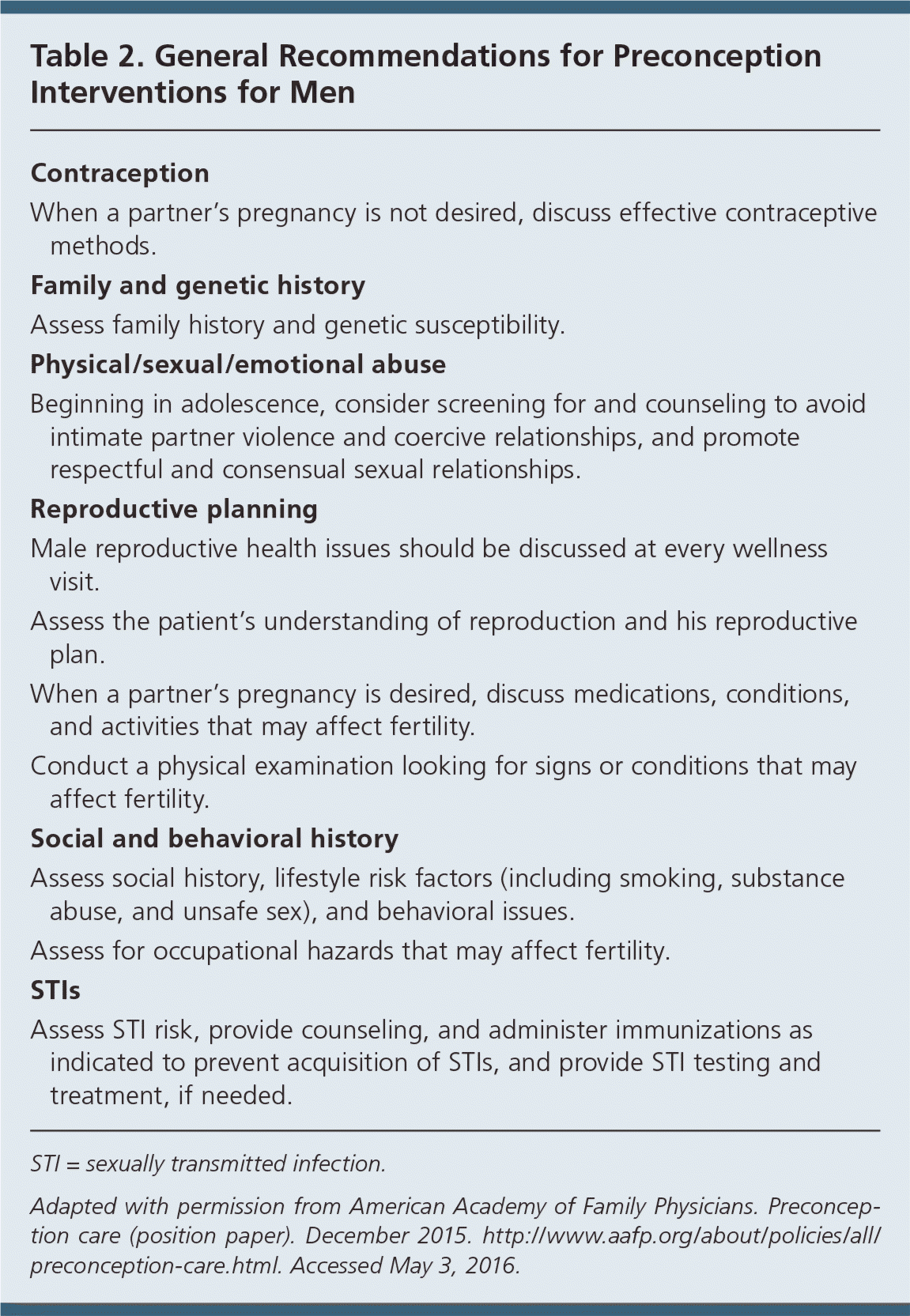
Am Fam Physician. 2016;94(6):508-510
Related letter: Discuss Oral Health with All Women of Child-Bearing Age
Author disclosure: No relevant financial affiliations.
Key Points for Practice
• A woman's reproductive plan should be discussed at each visit because her plans may change depending on life circumstances.
• Women of reproductive age should take a daily supplement of 400 to 800 mcg of folic acid, starting before conception, and consume a balanced diet of folate-rich foods to reduce the risk of neural tube defects.
• Health concerns in men such as diabetes mellitus, erectile dysfunction, and testicular conditions may affect fertility.
• A man's lifestyle factors, including tobacco smoking and sexually transmitted infections, can directly impact his partner's pregnancy.
From the AFP Editors
Preconception care is defined as personalized care for men and women that is focused on reducing maternal and fetal morbidity and mortality, increasing chances of conception, and preventing unintended pregnancies. Family physicians have the opportunity to discuss risk factors that negatively impact maternal and infant health such as being overweight, smoking, hypertension, and diabetes mellitus.
There are multiple barriers to providing comprehensive preconception care. Usually, preconception is focused on patients planning a pregnancy. Because one-half of U.S. pregnancies are reported as unintended, the timing of addressing preconception is a challenge. Most women recognize the need for counseling before conception to achieve optimal health outcomes, but the majority reported that they did not receive any counseling, and most physicians did not provide or recommend counseling to their patients of reproductive age. The American Academy of Family Physicians (AAFP) has released a position paper providing evidence-based recommendations that address reproductive health care.
Preconception Interventions for Women
A woman's reproductive plan should be discussed at each visit because her plans may change depending on life circumstances. These discussions should include risks due to age, maternal or paternal conditions, and obstetric and family history. Women who wish to prevent pregnancy should be offered contraceptive methods approved by the U.S. Food and Drug Administration, an assessment to identify safe methods, counseling to help choose a contraceptive method, and prompt delivery of the contraceptive method selected. Shared decision making and tailored information should focus on patient preferences. Routine counseling about emergency contraception should also be available when needed.
Overall health and management of chronic conditions are essential for proper preconception care. Women of reproductive age should take a daily supplement of 400 to 800 mcg of folic acid, starting before conception and continuing through 12 weeks of pregnancy, and consume a balanced diet of folate-rich foods to reduce the risk of neural tube defects. Obesity, chronic hypertension, diabetes, and lifestyle risks (e.g., use of alcohol, tobacco, illicit substances) can lead to pregnancy complications and should be addressed, as well as counseling on medication use. Many commonly prescribed medications are considered unsafe in pregnancy and it may be necessary to switch to safer medications before conception. A mental health assessment should be included in preconception care because mood and anxiety disorders are highly prevalent in women of reproductive age, with a high prevalence of relapse of a previously diagnosed mental health disorder or a new-onset disorder in pregnancy. Treatment for these disorders during pregnancy should be individualized. Immunization status should be evaluated annually in all women of reproductive age.
Table 1 shows general recommendations for preconception interventions for women.

| Chronic disease management |
| Hypertension: women of reproductive age should have blood pressure checks during routine care. If diagnosed with hypertension, they should be counseled on lifestyle changes and medications that are safe in pregnancy. |
| Diabetes mellitus: women who have diabetes should be counseled about the importance of glycemic control. |
| Depression and anxiety disorders: women of reproductive age should be screened for depression and anxiety disorders and counseled about potential risks of untreated illness. Medications should be prescribed or adjusted before conception, if appropriate. |
| Assess for use of teratogenic medications and optimize risk profile of medications. |
| Contraception |
| When pregnancy is not desired, discuss safe sex and effective contraceptive methods. |
| Family and genetic history |
| Assess pregnancy risks on the basis of maternal age, maternal and paternal health, obstetric history, and family history. |
| Folic acid |
| All women of reproductive age should be advised to take folic acid and to consume a balanced, healthy diet including folate-rich foods. Women at high risk of neural tube defects should take higher levels of folic acid. |
| Immunizations |
| Immunization status should be reviewed annually and updated as needed. |
| Physical/sexual/emotional abuse |
| All women of reproductive age should be screened for current, recent past, or childhood physical, sexual, or emotional interpersonal violence and referred to appropriate resources when needed. |
| Reproductive planning |
| Discuss reproductive goals and issues at each visit. |
| When pregnancy is desired, discuss medications, health conditions, and activities that may affect fertility. |
| Offer a full range of contraceptive methods and provide appropriate counseling tailored to each patient's preference. |
| Counsel women on the importance of birth spacing. |
| Social and behavioral history |
| Assess social history, lifestyle, and behavioral issues that may affect pregnancy. |
| All women of reproductive age should be screened for alcohol consumption, tobacco use, and drug use. |
| STIs |
| For all women of reproductive age and their partners, assess STI risk, provide counseling and immunizations as indicated to prevent acquisition of STIs, and provide STI testing and treatment, if needed. |
| Weight |
| All women with a body mass index greater than or equal to 30 kg per m2 or less than 18.5 kg per m2 should be counseled about possible infertility issues and risks during and after pregnancy. |
Preconception Interventions for Men
The Centers for Disease Control and Prevention and the U.S. Department of Health and Human Services have recognized the need for improvements in meeting men's reproductive health needs. The objective of preconception interventions for men is to ensure positive outcomes of their reproductive and sexual behaviors, while minimizing negative consequences of unhealthy lifestyle choices. Men should be counseled on contraception, overcoming fertility issues, ensuring a healthy pregnancy for his partner, and ensuring optimal postpartum outcomes for his partner and child (Table 2).

| Contraception |
| When a partner's pregnancy is not desired, discuss effective contraceptive methods. |
| Family and genetic history |
| Assess family history and genetic susceptibility. |
| Physical/sexual/emotional abuse |
| Beginning in adolescence, consider screening for and counseling to avoid intimate partner violence and coercive relationships, and promote respectful and consensual sexual relationships. |
| Reproductive planning |
| Male reproductive health issues should be discussed at every wellness visit. |
| Assess the patient's understanding of reproduction and his reproductive plan. |
| When a partner's pregnancy is desired, discuss medications, conditions, and activities that may affect fertility. |
| Conduct a physical examination looking for signs or conditions that may affect fertility. |
| Social and behavioral history |
| Assess social history, lifestyle risk factors (including smoking, substance abuse, and unsafe sex), and behavioral issues. |
| Assess for occupational hazards that may affect fertility. |
| STIs |
| Assess STI risk, provide counseling, and administer immunizations as indicated to prevent acquisition of STIs, and provide STI testing and treatment, if needed. |
FERTILITY AND CONCEPTION
Studies have identified several factors that affect sperm quality, quantity, concentration, and motility. Health concerns such as diabetes, erectile dysfunction, and testicular conditions may affect fertility. Certain medications can alter the hypothalamic-pituitary-gonadal axis, contribute to reduced male libido and erectile dysfunction, and have toxic effects on sperm. Tobacco, alcohol, and drug use can affect spermatogenesis. Other factors that can affect sperm quality and production are stress, obesity, genetic disorders, and exposure to certain hazardous materials.
EFFECTS ON MATERNAL AND FETAL OUTCOMES
A man's lifestyle factors can directly impact his partner's pregnancy (e.g., tobacco smoking, sexually transmitted infections). Secondhand smoke can lead to low birth weight, intrauterine growth restriction, and preterm birth, as well as increase the risk of sudden infant death syndrome. Paternal involvement during pregnancy can have a positive effect on health outcomes for himself, his partner, and child. During wellness visits, physicians have the opportunity to discuss issues such as intimate partner violence and coercive relationships, and to promote consensual sexual relationships.
A link between paternal genetics and age and conditions such as autism and schizophrenia has been found. Screening for genetic conditions should be discussed and offered if needed.
Guideline source: American Academy of Family Physicians
Evidence rating system used? No
Literature search described? No
Guideline developed by participants without relevant financial ties to industry? Not reported
Published source: AAFP, December 2015
